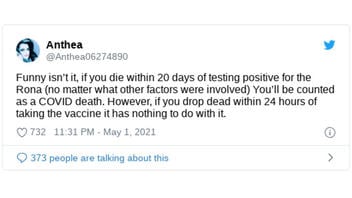
If you die within 20 days of testing positive for COVID-19 are you therefore added to the pandemic's death toll? No, that's not true: The claim was made with no offer of proof and in apparent ignorance of the systems by which cause of death is determined and documented. Lead Stories found no publicly available evidence of a 20-day rule or guideline and the president of the National Association of Medical Examiners said it would be extremely unlikely that local coroners and medical examiners would submit to federal pressure to act counter to their training. While the United States Centers for Disease Control and Prevention compiles lists of deaths by cause, the agency has no control over what goes on a death certificate and cannot overrule the medical examiners in 2,000 independent jurisdictions across the United States.
The claim appeared in a tweet (archived here) published May 2, 2021. It opened: "Funny isn't it, if you die within 20 days of testing positive for the Rona (no matter what other factors were involved) You'll be counted as a COVID death." It continued:
However, if you drop dead within 24 hours of taking the vaccine it has nothing to do with it.
This is what the post looked like on Twitter at the time of writing:
(Source: Twitter screenshot taken on Mon May 3 19:16:17 2021 UTC)
While the first sentence of the tweet makes a fact claim ("... you will be counted...) the second appears to be opinion. This fact-check addresses the unsupported fact claim in the first sentence.
The feds aren't in charge
Dr. James Gill, a forensic pathologist who serves as president of the National Association of Medical Examiners, told Lead Stories in a May 3, 2021, email the way U.S. vital statistics are generated would make a nationwide conspiracy extremely unlikely:
Death investigation and certification is a local process. The Feds get involved at the end--after the death certificates have been recorded and processed by the states ... Given that there are over 2,000 different death investigation jurisdictions and thousands and thousands of individual death certifiers, the idea that there is some massive conspiracy is inconceivable to me.
Gill, the chief medical examiner for the state of Connecticut, said under-reporting is more likely because some people who die at home may not have been previously tested, making it harder for an attending physician to definitively declare COVID was the underlying cause of death. Gill said there are several medical reasons the COVID-19 death toll in the U.S. is probably higher -- not lower -- than the official number:
...In order for COVID-19 to be listed on the death certificate, the infection must have caused or contributed to death. This can become more challenging with patients who have recovered from COVID-19 and then die weeks later. As many of these patients have underlying health conditions, it is not unexpected that some would die regardless of any prior COVID-19 infection. To use some arbitrary cutoff (like 20 days) is not acceptable.
Every local jurisdiction has its own death reporting rules
Gill said those determining cause of death across the United States include elected lay coroners, physician medical examiners like himself, sheriff-coroners, justices of the peace, state systems like Florida's, count systems and other approaches.
He said local and state laws, and variations in funding mean that death investigations for the purpose of death certificates are not identical from place to place, which would further impede a conspiracy. Finally, "For most offices and systems, deaths from COVID-19 do not technically fall under the jurisdiction of medical examiners, as they are natural deaths," he said. In those cases, the treating physician usually fills out those death certificates.
The CDC offers advice, not regulations, to death certifiers, and no 20-day rule
With so many authorities and sets of rules, the CDC encourages consistent death reporting by publishing non-binding guidelines to help doctors and medical examiners and coroners work their way through the standard death certificate. Those guidelines say nothing about attributing a death to COVID if the patient tested positive up to 20 days before death.
The CDC's April 2020 guidance, posted by the CDC one month after the World Health Organization declared the COVID outbreak a pandemic, emphasizes the medical professional's judgement:
When reporting cause of death on a death certificate, use any information available, such as medical history, medical records, laboratory tests, an autopsy report, or other sources of relevant information. Similar to many other diagnoses, a cause-of-death statement is an informed medical opinion that should be based on sound medical judgment drawn from clinical training and experience, as well as knowledge of current disease states and local trends.
The CDC guidelines emphasize the difference between patients who merely have COVID-19 and those for whom it is the cause of death:
The immediate cause of death, which is the disease or condition that directly preceded death and is not necessarily the underlying cause of death (UCOD), should be reported on line a.
The conditions that led to the immediate cause of death should be reported in a logical sequence... The UCOD, which is "(a) the disease or injury which initiated the train of morbid events leading directly to death or (b) the circumstances of the accident or violence which produced the fatal injury" (7), should be reported on the lowest line used in Part I.
... In cases where a definite diagnosis of COVID-19 cannot be made, but it is suspected or likely (e.g., the circumstances are compelling within a reasonable degree of certainty), it is acceptable to report COVID-19 on a death certificate as "probable" or "presumed."
In these instances, certifiers should use their best clinical judgement in determining if a COVID-19 infection was likely. However, please note that testing for COVID-19 should be conducted whenever possible.


















